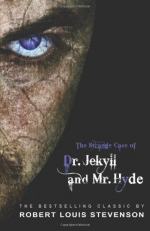|
|
Dr. Jekyll and Mr. Hyde Notes & Analysis
The free Dr. Jekyll and Mr. Hyde notes include comprehensive information and analysis to help you understand the book. These free notes consist of about 29 pages (8,467 words) and contain the following sections:
These free notes also contain Quotes and Themes & Topics on Dr. Jekyll and Mr. Hyde by Robert Louis Stevenson.
Dr. Jekyll and Mr. Hyde Plot Summary
As Mr. Utterson (a respected lawyer) and Mr. Enfield (a businessman and distant cousin) are taking a walk, they come across a mysterious looking door. Mr. Enfield is reminded of a strange man connected with that door. That man had run over a girl and as compensation, emerged from the door with a check worth nearly one hundred pounds. The signature on the check is that of Mr. Utterson's old friend, Dr. Jekyll. Furthermore, Mr. Utterson notices that the door leads to a laboratory that is connected to Dr. Jekyll's house. Upon hearing the story, Mr. Utterson goes to his study and takes out Dr. Jekyll's Will. It states that upon the death or disappearance of Dr. Jekyll, a certain Edward Hyde is to inherit the estate. Mr. Utterson is convinced that there is something amiss with the will and goes to Dr. Jekyll to inquire about it. Dr. Jekyll tells Mr. Utterson that there is nothing wrong, and to Mr. Utterson's displeasure, refuses to discuss his connection with the odd Hyde fellow.
Almost a year later, a maid looking out her window sees a man club an elderly man to death. The maid recognizes the murderer as Edward Hyde. The victim is a respected gentleman, Sir Danvers Carew, who is also Mr. Utterson's client. After the murder, Mr. Utterson accompanies a police inspector to Hyde's residence in seedy Soho. Hyde is nowhere to be found. Fearing for Dr. Jekyll's safety, Mr. Utterson confronts him once again about his connection with Hyde. Dr. Jekyll swears that he will have nothing to do with Hyde ever again. He even presents a letter signed by Hyde that states Dr. Jekyll has nothing to fear.
Time passes and to Mr. Utterson's relief, Dr. Jekyll returns to his former self, hosting parties and helping out with many charities. Then suddenly, Dr. Jekyll refuses to see people. And mysteriously, Dr. Lanyon, a close friend to both Mr. Utterson and Dr. Jekyll becomes deathly ill. When Mr. Utterson visits him, Dr. Lanyon refuses to talk about Dr. Jekyll. He gives Mr. Utterson a letter that must be opened only upon his death. A week later, Dr. Lanyon passes away.
While Mr. Utterson and Mr. Enfield are taking another walk, they come across Dr. Jekyll looking out his window. As they talk to him, they witness a horrifying transformation in the doctor's appearance and demeanor that leave them stunned and speechless.
One night, Poole requests Mr. Utterson's help. It seems Dr. Jekyll has locked himself in his laboratory. When Poole and Mr. Utterson approach the door, they hear Hyde's voice. Thinking that there has been foul play, Poole and Mr. Utterson force their way inside. On the floor, they see Hyde's dead body, fitted in Dr. Jekyll's oversized clothes. Inside, they find a letter written by Dr. Jekyll.
Mr. Utterson reads Dr. Lanyon's letter and finds out that Dr. Jekyll was having problems with some unexpected effects of the drug. At various times of the day, Dr. Jekyll would turn into Hyde. During one of those unexpected changes, Dr. Jekyll, who was embodied by Hyde, requested Dr. Lanyon's help in acquiring the ingredients needed for the potion because he could not show himself. In Dr. Lanyon's presence, Hyde transformed himself into Dr. Jekyll. The shock from this event was the cause of Dr. Lanyon's illness and eventual death.
Finally, Mr. Utterson reads Dr. Jekyll's own confession. Dr. Jekyll's initial reasons for developing the drug was to test his theory that man has a dual nature. He was successful in separating the good and evil sides of himself. As Hyde, Dr. Jekyll lived the free and fleshly life of his evil side. But the effects of the drug became unpredictable. Discovering that he cannot get hold of a crucial type of salt, Dr. Jekyll realized that he could no longer continue in this double life. In the laboratory, unsuccessful at recreating the drug, Dr. Jekyll killed himself before Poole and Mr. Utterson could break in. Dr. Jekyll wrote the confession with the knowledge that if the Hyde character won over his nature, there would be no turning back.




